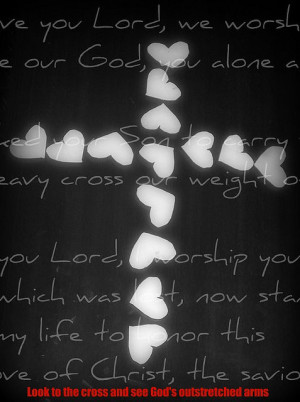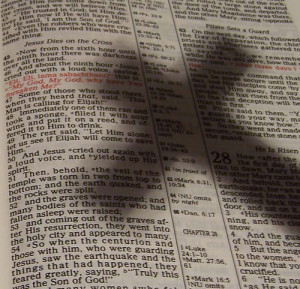 As we seek to learn why bad things happen in this world, we are looking at several principles of a theological chaos theory. We are currently discussing the point that due to the fall of humanity, nature has spun out of control. In yesterday’s post we saw that Scripture and theology seems to indicate that in some way humans were enabled by God to guide and control natural forces, but when we sinned, we lost this ability, and nature spun out of control.
As we seek to learn why bad things happen in this world, we are looking at several principles of a theological chaos theory. We are currently discussing the point that due to the fall of humanity, nature has spun out of control. In yesterday’s post we saw that Scripture and theology seems to indicate that in some way humans were enabled by God to guide and control natural forces, but when we sinned, we lost this ability, and nature spun out of control.
Due to sin, we lost control of the powers that control nature, and having spun out of control, they now wreak havoc on the world. There is now disarray and chaos in creation.
From this, we can know several things.
Storms are Not Sent “From God”
First, when storms and disasters occur, they do not “come from God.” Storms are not sent by God. (I know that some will object and point to the Flood or to the storm that God sent to bring back a fleeing Jonah. We will look at these texts at a later time.)
Storms occur because the forces of nature are out of control. Much of the work of God on earth is focused on protecting humanity from complete destruction at the hand of these destroying powers. Sometimes God “withdraws” His hand of protection and allows storms to rage, but we must be careful with saying that this is why all storms occur. We do not know why God allows some storms. When it comes to storms, there is much we do not know.
For example, we will never know all of the boundaries that God has placed upon the destructive powers so that they do not overwhelm and annihilate mankind forever. We can never know how many disasters have been averted, how many floods have been avoided, how many meteorites have been nudged off course by God. And when storms and disasters do occur, we can never know what string of events and decisions by God, angels, and human beings led to that storm occurring.




 As we try to understand the theology behind the idea that on the cross, Jesus reveals to us what God was doing in the Old Testament, we are in a section where we recognize that there are no “pat answers” to the problem of evil in the world, and that the situation is much more complex than most of us realize. I have about six points to a “
As we try to understand the theology behind the idea that on the cross, Jesus reveals to us what God was doing in the Old Testament, we are in a section where we recognize that there are no “pat answers” to the problem of evil in the world, and that the situation is much more complex than most of us realize. I have about six points to a “
 I
I  And let me tell you, he NAILED it. He basically said the same thing I have been saying in my series on this blog.
And let me tell you, he NAILED it. He basically said the same thing I have been saying in my series on this blog.
 In those writings most Christians refer to as the Old Testament, we find a God who bears a striking resemblance to the gods of the nations that surrounded ancient Israel. Anger him and you suffered (poor crops, infertility, death at the hand of the enemy, the earth opened and swallowed you). Please him and you were blessed (good crops, many children, victory in battle).
In those writings most Christians refer to as the Old Testament, we find a God who bears a striking resemblance to the gods of the nations that surrounded ancient Israel. Anger him and you suffered (poor crops, infertility, death at the hand of the enemy, the earth opened and swallowed you). Please him and you were blessed (good crops, many children, victory in battle).

 In response to a great question from
In response to a great question from 
 First, note that both texts seem to refer to something that happens to people after they die. I don’t know what sorts of “punishment” God might have in store for people after death, but again, using Jesus as the guiding principle, I highly doubt that God is going to torture people for all eternity by burning them in fire. I do not believe in annihilationism, nor do I believe in universalism, but I also do not believe in eternal conscious torment.
First, note that both texts seem to refer to something that happens to people after they die. I don’t know what sorts of “punishment” God might have in store for people after death, but again, using Jesus as the guiding principle, I highly doubt that God is going to torture people for all eternity by burning them in fire. I do not believe in annihilationism, nor do I believe in universalism, but I also do not believe in eternal conscious torment.